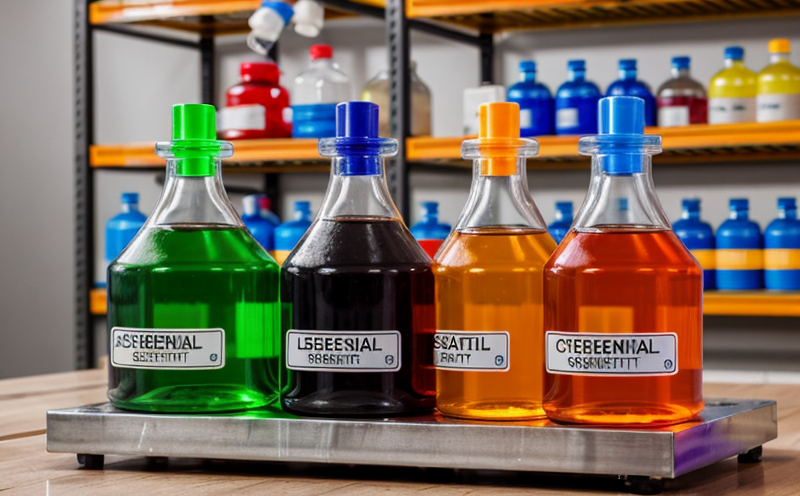Allergen Testing in Cosmetics and Personal Care Products
As a leading laboratory specializing in consumer products & product safety testing, we provide comprehensive allergen testing services specifically tailored to the unique needs of cosmetics and personal care products. This service ensures that formulations are safe for use by consumers who may have sensitivities or allergies.
Allergenic substances can be unintentionally introduced into cosmetic products through various stages of production, from raw material procurement to final product formulation. These allergens include proteins derived from plants (e.g., nuts), animals (e.g., fish, crustaceans), and microorganisms as well as synthetic chemicals like formaldehyde-releasing agents.
The importance of detecting these potential triggers cannot be overstated. Not only does it protect end-users from adverse reactions such as rash, hives, or even anaphylaxis; it also helps manufacturers maintain their brand reputation and comply with regulatory requirements worldwide.
Our testing process begins by collecting samples according to standard sampling procedures outlined in relevant international standards like ISO 15216-1 for cosmetic products. Once collected, the samples undergo rigorous analysis using advanced techniques such as liquid chromatography coupled with mass spectrometry (LC-MS/MS), enzyme-linked immunosorbent assays (ELISAs), and peptide arrays.
It is crucial to note that not all allergens can be detected by these methods. For instance, certain proteins may degrade during processing or packaging making them undetectable in finished products despite being present in raw materials. Therefore, understanding the entire supply chain is essential for accurate testing results.
In addition to detecting known allergens, our laboratory also conducts studies on new compounds suspected of having allergenic properties based on chemical structure similarities with established allergens or reported cases of sensitization.
Our experienced team works closely with clients throughout every step of the process—from consultation regarding which tests are most appropriate given the specific nature of each product line to interpretation of results and recommendations for adjustments where necessary.
Why It Matters
The safety of cosmetic products is paramount, especially considering that many individuals have known allergies or sensitivities. By conducting thorough allergen testing, companies can ensure their products are free from harmful substances that could cause adverse reactions among users.
- Consumer Trust: Safe products build trust with consumers, leading to increased loyalty and repeat purchases.
- Legal Compliance: Many countries have stringent regulations governing the use of allergens in cosmetics. Ensuring compliance helps avoid costly legal actions and fines.
Beyond mere regulatory adherence, offering safe products fosters a positive brand image among health-conscious consumers who increasingly prioritize their well-being over price.
Benefits
- Enhanced Product Safety: Identifying and eliminating allergens reduces the risk of severe allergic reactions, enhancing overall product safety.
- Improved Reputation: A reputation for producing safe, quality products enhances brand value and attracts more customers.
- Avoidance of Legal Issues: By ensuring compliance with local laws regarding allergen content in cosmetics, companies can avoid potential legal troubles.
Our laboratory offers a range of services designed to meet the diverse needs of our clients. Our expertise lies not only in identifying common allergens but also in detecting emerging risks through cutting-edge research and development efforts.
We understand that each cosmetic product has its own specific requirements, so we offer tailored solutions aimed at addressing unique challenges faced by different types of products within this sector.
International Acceptance and Recognition
Our laboratory adheres to the highest standards set forth by international organizations such as ISO (International Organization for Standardization) and ASTM International. Compliance with these guidelines ensures that our tests are globally accepted, which is critical for businesses operating across multiple jurisdictions.
- ISO 15216-1: This standard provides guidance on how to identify allergenic substances in cosmetic products. It serves as a benchmark for ensuring consistency and reliability of testing results internationally.
- ASTM E2307: Another key document that defines procedures for evaluating the potential allergenicity of ingredients used in personal care products.
Besides adhering to these standards, our laboratory maintains memberships with relevant industry associations and participates actively in conferences and workshops aimed at promoting best practices in allergen testing.
Our commitment to international acceptance extends beyond mere compliance. We continuously invest in training our staff on the latest techniques and technologies so that they remain up-to-date with global trends and developments in this field.





